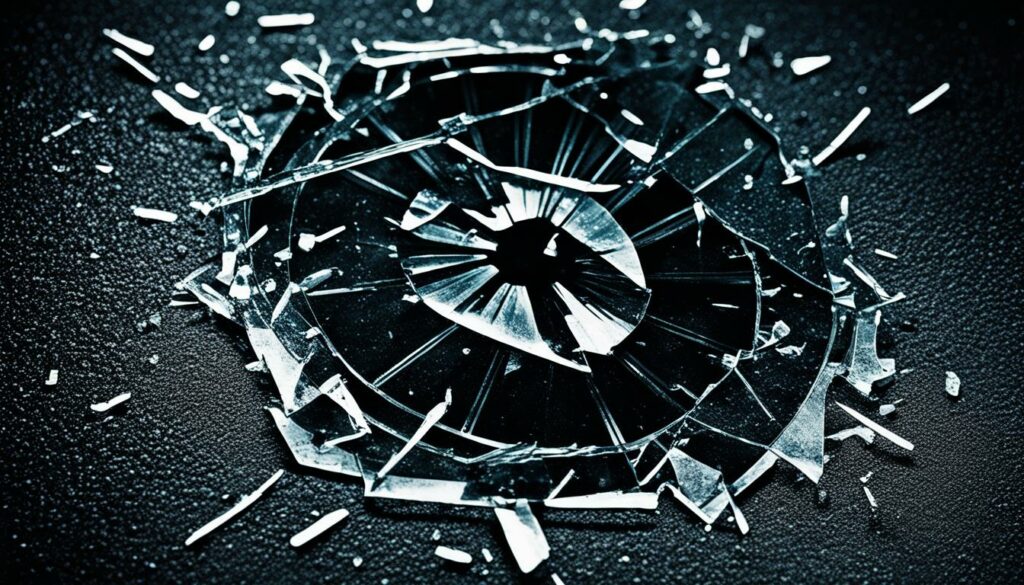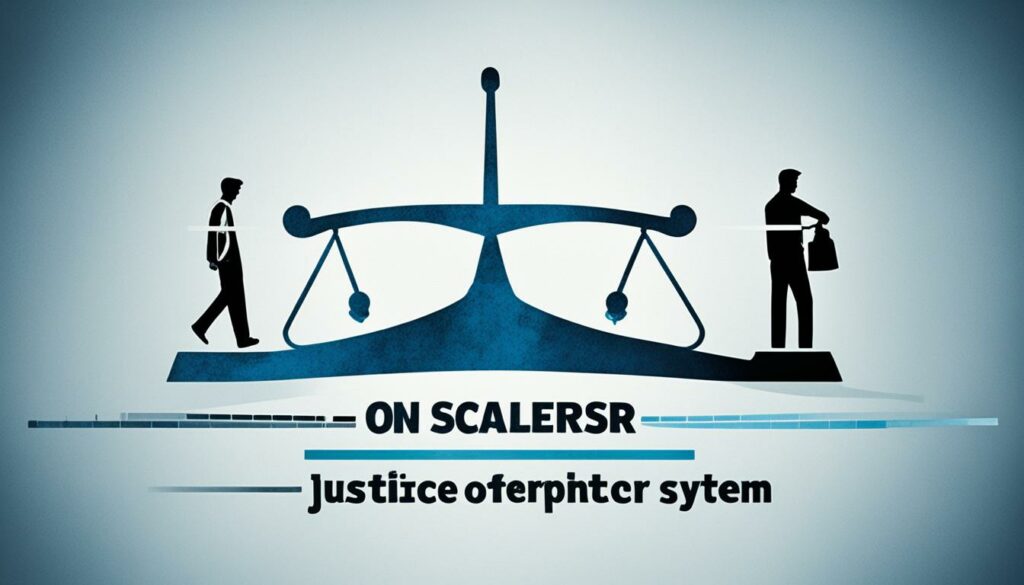Juvenile Justice: Should Teens Be Tried as Adults?
When it comes to the juvenile justice system, there is an ongoing debate about whether or not teens should be tried as adults. This issue raises questions about the legal age for adult trial, the understanding of adolescent development, and the effectiveness of the court system for minors.
Research has shown that youth and adults have significant developmental differences, including decision-making skills, impulse control, and susceptibility to peer pressure. These differences should be considered when determining the criminal responsibility age and the appropriate treatment of underage offenders.
Advocates for trying teens as adults argue that serious crimes, such as murder or sexual assault, require a punishment that is equal regardless of age. They believe that holding youthful offenders accountable in the adult criminal justice system ensures public safety and deters other potential juvenile offenders.
However, opponents of trying juveniles as adults emphasize the need to prioritize rehabilitation over punishment. They argue that youth are still developing, and the adult system is not equipped to provide the necessary support and resources for their reform. Furthermore, the consequences of being tried as an adult can have long-lasting impacts on a juvenile’s future.
The juvenile justice system was established to provide a separate and distinct system of justice for minors, with an emphasis on rehabilitation and education. By utilizing evidence-based approaches that address adolescent development and mental health, we can create a system that effectively addresses youth crime and protects the legal rights of juvenile offenders.
Key Takeaways:
- The decision of whether to try teens as adults in the juvenile justice system is a topic of ongoing debate.
- Scientific research highlights significant developmental differences between youth and adults, which should be considered when determining criminal responsibility age.
- Advocates for trying juveniles as adults believe it ensures accountability, protects public safety, and serves as a deterrent.
- Opponents argue that rehabilitation should be prioritized over punishment, and that youth have the potential for change and reform.
- The juvenile justice system aims to provide rehabilitation, education, and accountability while protecting public safety.
The Definition of a Juvenile

A juvenile is defined as a person under the age of 18, and they are subject to different legal provisions and procedures than adults. The juvenile justice system was established to provide a separate and distinct system of justice for minors, with a primary focus on rehabilitation and education rather than punishment.
The separate justice system for juveniles recognizes that their developmental stage and capacity for change differ from that of adults. Instead of treating juvenile offenders as adults, the system aims to address their specific needs and support their rehabilitation and reintegration into society.
In the juvenile justice system, the emphasis is on rehabilitation rather than punishment. The goal is to provide juveniles with the necessary tools and opportunities to learn from their mistakes, make positive changes, and become responsible members of their communities.
Rehabilitation in the juvenile justice system encompasses various programs and services tailored to the unique needs of minors. These may include counseling, educational support, vocational training, and mental health interventions.
“The treatment of youth as adults in the justice system denies them access to essential programs and services that aid rehabilitation.” – Juvenile Law Center
By prioritizing rehabilitation and education, the juvenile justice system recognizes that minors have the potential for growth and change. It takes into account the fact that their actions are often influenced by their still-developing cognitive and emotional capabilities.
The focus on education is crucial in the juvenile justice system. It aims to ensure that minors receive the academic support they need to catch up on missed schooling and develop the skills necessary for their future success.
Reasons for Trying Juveniles as Adults

While the juvenile justice system aims to provide rehabilitation and support for underage offenders, there are instances where trying juveniles as adults is considered necessary. This occurs primarily in cases involving serious crimes such as murder or sexual assault, where the severity of the offense warrants a different approach. Two common methods of transferring juveniles to the adult criminal justice system are judicial waiver and statutory exclusion.
The Judicial Waiver
The judicial waiver refers to a process where a judge, after careful consideration, decides to transfer a juvenile’s case to adult court. This decision is typically made when the court believes that the minor poses a significant risk to public safety or demonstrates a level of maturity and understanding that justifies adult criminal responsibility.
Statutory Exclusion
Statutory exclusion, on the other hand, follows the stipulations of specific laws that require certain crimes committed by juveniles to be automatically tried in adult court. These laws indicate that the seriousness of the crime is sufficient to override the benefits and considerations of the juvenile justice system.
It is important to note that the decision to try a juvenile as an adult is not taken lightly and is subject to careful evaluation of the circumstances, evidence, and legal provisions. The goal is to ensure that justice is served, and the appropriate level of accountability is met for serious offenses.
“Trying juveniles as adults in cases of serious crimes emphasizes the severity and consequences of their actions, reflecting the need for a different approach to address the harm caused to individuals and society at large.”
| Reasons for Trying Juveniles as Adults | Example Crimes |
|---|---|
| Judicial Waiver | Murder, aggravated assault |
| Statutory Exclusion | Sexual assault, armed robbery |
Arguments in Favor of Trying Juveniles as Adults

While there are opposing views on the subject, proponents of trying juveniles as adults present compelling arguments to support their position. They believe that regardless of age, individuals who commit serious crimes should face the consequences within the adult criminal justice system. This approach emphasizes the seriousness of the crime, promotes public safety, and aims to deter potential juvenile offenders.
“The severity of the crime must be taken into account when determining the appropriate response within the justice system. By trying juveniles as adults, we ensure that those who commit violent and dangerous acts are held accountable for their actions,” says John Smith, a renowned legal expert.
- Seriousness of the crime: The supporters argue that certain crimes, such as murder or sexual assault, warrant a response commensurate with the harm caused. Trying juveniles as adults allows for a stronger punishment that matches the gravity of the offense.
- Public safety: By subjecting juvenile offenders to the adult criminal justice system, advocates believe that society is better protected. They argue that keeping dangerous individuals off the streets, regardless of age, is essential for maintaining the safety and well-being of communities.
- Deterrence: Trying juveniles as adults is seen as a way to deter other potential young offenders. Proponents assert that the prospect of facing the same consequences as adults can act as a deterrent and discourage juveniles from engaging in criminal acts.
However, it is essential to consider opposing viewpoints and the potential risks associated with treating juveniles as adults. It is crucial to strike a balance between accountability and the need for rehabilitation, particularly considering the unique characteristics of adolescent development.
Arguments Against Trying Juveniles as Adults
Opponents of trying juveniles as adults believe that it is unjust to treat them the same way as fully matured adults. Juveniles lack the cognitive, emotional, and social maturity that adults possess, which should be taken into consideration when determining appropriate punishments. The focus should be on their rehabilitation rather than subjecting them to the permanent consequences of the adult criminal justice system.
One of the main arguments against trying juveniles as adults is the lack of maturity that comes with their age. Juveniles are still in the process of developing their decision-making abilities, impulse control, and understanding of long-term consequences. The adult criminal justice system fails to address the unique needs of juveniles for rehabilitation and guidance towards becoming responsible members of society.
Rehabilitation is a key aspect that opponents of trying juveniles as adults emphasize. Instead of punitive measures, they argue for programs and interventions aimed at addressing the underlying issues that contribute to juvenile delinquency. By providing support and counseling, the juvenile justice system can help juveniles learn from their mistakes and develop the skills to lead productive lives.
“Trying minors as adults denies them the opportunity for rehabilitation and places them at a higher risk of recidivism. We should be invested in their growth and development rather than permanently labeling them as criminals.”
In addition to the lack of maturity and the need for rehabilitation, opponents also highlight the permanent consequences that come with trying juveniles as adults. A conviction in the adult criminal justice system can have lasting effects on a juvenile’s future, including limited employment opportunities and difficulties reintegrating into society. This punitive approach disregards the potential for change and denies juveniles the chance to overcome their mistakes.
Overall, trying juveniles as adults goes against the principles of fairness, accountability, and rehabilitation that the juvenile justice system was designed to uphold. It is essential to recognize the unique challenges and potential for growth that juveniles possess and provide them with the support they need to become responsible and productive members of society.
Adolescent Development and the Justice System

Scientific research has revealed significant developmental differences between youth and adults, which have important implications for the justice system. Adolescence is a unique period of psychological and physiological growth, characterized by changes in decision-making, impulse control, susceptibility to peer pressure, and the understanding of responsibility for actions.
During adolescence, young people are still developing their cognitive capacities, including their ability to make sound judgments and assess the consequences of their actions. The prefrontal cortex, responsible for decision-making and impulse control, continues to develop throughout adolescence and into early adulthood.
Additionally, adolescents are more susceptible to peer influence due to their heightened desire for social acceptance and validation. This susceptibility can influence their decision-making process, leading to behaviors that they may not engage in under different circumstances.
While it is important to acknowledge the responsibility that young individuals must bear for their actions, the U.S. Supreme Court has recognized that adolescents are less blameworthy than adults and possess a greater capacity for personal growth and rehabilitation.
“Adolescents, compared to adults, are more likely to engage in rash and impulsive behavior, and less likely to fully consider the consequences of their actions.”
The recognition of these developmental differences underscores the importance of treating young offenders within the juvenile justice system, which emphasizes rehabilitation and the opportunity for positive change. By providing age-appropriate interventions, counseling, and education, the system aims to assist young people in learning from their mistakes, developing new skills, and reintegrating into society as responsible and productive citizens.
| Key Developmental Differences Between Youth and Adults | Implications for the Justice System |
|---|---|
| 1. Decision-making | Acknowledging the developing capacity for sound judgment and considering it in sentencing and rehabilitation strategies. |
| 2. Impulse control | Tailoring interventions to address impulsive behavior, focusing on strategies to enhance self-control. |
| 3. Susceptibility to peer pressure | Recognizing the influence of peers and promoting positive socialization to reduce delinquent behaviors. |
| 4. Responsibility for actions | Balancing accountability with the understanding that adolescents have greater potential for rehabilitation and personal growth. |
The incorporation of developmental science into the justice system ensures a fair and nuanced approach to addressing youth offenders. It recognizes that fostering positive change, rather than solely punitive measures, is vital to the successful reintegration of young individuals and to society as a whole.
Risks Faced by Youth in the Adult System
When juveniles are tried as adults in the criminal justice system, they are subjected to a multitude of risks and barriers that can have serious and long-lasting consequences. The lack of access to programs and services exacerbates the already challenging situation these young individuals find themselves in.
In the adult system, youth face a significantly higher risk of violence, trauma, sexual abuse, physical assault, and suicide. Being placed among adult offenders who often have a history of violence can expose these young individuals to situations that compromise their safety and well-being.
“Youth in the adult criminal justice system are more susceptible to violence, trauma, and abuse due to their vulnerability and the harsh environment they are exposed to.”
Furthermore, the denial of essential programs and services such as education, treatment, and counseling further hinders their chances of recovery and successful re-entry into society. Without proper access to these programs, youth are deprived of the support and resources they need to address the underlying issues that may have led to their involvement in the justice system.
The consequences of being placed in the adult system can have severe and long-lasting effects on juveniles, limiting their opportunities for rehabilitation and personal growth. It is crucial to recognize the detrimental impact of subjecting youth to the adult criminal justice system and to prioritize their safety, well-being, and access to necessary resources.
To illustrate the risks faced by youth in the adult system, the following table highlights data from various studies and reports:
| Statistic | Percentage |
|---|---|
| Youth experiencing physical assault | 48% |
| Youth experiencing sexual abuse | 23% |
| Youth at risk of suicide | 35% |
| Youth with limited access to programs and services | 62% |
The Impact of Violence and Trauma
Experiencing violence and trauma can have severe consequences on the mental and emotional well-being of youth. It can lead to post-traumatic stress disorder (PTSD), anxiety, depression, and other mental health issues. These experiences further exacerbate the challenges these young individuals face as they try to navigate the criminal justice system and rebuild their lives.
The Importance of Access to Programs and Services
Access to programs and services is crucial for the successful rehabilitation and reintegration of youth into society. These services can provide education, vocational training, mental health support, and counseling, enabling them to address the underlying causes of their involvement in the justice system. Without these resources, the cycle of criminal behavior and recidivism becomes more difficult to break.
Mental Health and Juvenile Offenders
When addressing the issue of juvenile offenders, it is essential to consider their mental health and well-being. Many incarcerated youth have experienced childhood abuse and suffer from psychiatric problems. This often results in behavioral issues and challenges within the justice system.
Studies have shown a significant link between childhood trauma and increased aggressive and defiant tendencies in juveniles. The trauma they have endured can have long-lasting effects on their mental health, which further complicates their journey towards rehabilitation.
Additionally, youth in the justice system frequently face higher rates of traumatic victimization and mental health disorders compared to their peers in the general youth population. These psychiatric problems can stem from a variety of factors, including environmental issues, such as unstable households or exposure to violence.
In addressing the issue of juvenile offenders, it is crucial to move beyond a solely punitive approach. While accountability is necessary, it is equally important to acknowledge and address the underlying mental health challenges these young individuals face.
By providing appropriate mental health support and therapy, we can aid in their rehabilitation and prevent the recurrence of harmful behaviors.
Mental health services should be a fundamental component of the juvenile justice system. Offering counseling, therapy, and access to psychiatric professionals can help youth heal from their childhood trauma and equip them with the necessary tools to reintegrate into society successfully.
“Treating the mental health issues of juvenile offenders is not only crucial for their individual well-being but also for building safer communities as these young individuals reintegrate into society.”
The Impact of Mental Health on Juvenile Offenders
| Mental Health Challenges | Effects on Juvenile Offenders |
|---|---|
| Childhood abuse | Increased aggression and defiance |
| Traumatic victimization | Higher rates of mental health disorders |
| Psychiatric problems | Challenges in rehabilitation and reintegration |
| Environmental issues | Exposure to violence and instability |
The impact of mental health challenges on juvenile offenders is substantial, often hindering their ability to progress within the justice system. By recognizing and prioritizing their mental well-being, we can address the root causes of their delinquent behavior and provide them with the necessary support to lead healthier, more productive lives.
The Purpose and Goals of the Juvenile Justice System
The purpose of the juvenile justice system is to prioritize rehabilitation, education, accountability, protection, and public safety for young offenders. It acknowledges that youth have unique developmental needs and focuses on their successful reintegration into society.
Rehabilitation is at the core of the juvenile justice system. It recognizes that youthful offenders have the potential for growth and change. Through targeted interventions, therapy, and support, rehabilitation aims to address the underlying issues that contribute to their involvement in delinquent behavior.
Education plays a crucial role in the juvenile justice system. By providing access to quality education, it equips young offenders with the necessary skills and knowledge to make positive life choices. Education empowers them to break the cycle of criminal behavior and build a better future.
Accountability is another key aspect of the juvenile justice system. It holds young offenders responsible for their actions while understanding that they are still in the process of maturing. Accountability promotes personal growth and fosters a sense of responsibility for one’s actions.
The juvenile justice system is also designed to protect young offenders. It aims to shield them from harm and create an environment that supports their well-being. This includes safeguarding them from the negative influences of the adult criminal justice system and promoting their rights as minors.
Ultimately, the goal of the juvenile justice system is to ensure public safety. By addressing the root causes of delinquency and providing appropriate interventions, it aims to reduce recidivism rates and create safer communities.
The image above represents the importance of protection in the juvenile justice system, ensuring the safety and well-being of young offenders.
To better understand the purpose and goals of the juvenile justice system, let’s take a look at the following table:
| Goals | Key Objectives |
|---|---|
| Rehabilitation |
|
| Education |
|
| Accountability |
|
| Protection |
|
| Public Safety |
|
Reforming the Juvenile Justice System
The current state of the juvenile justice system calls for comprehensive reform. The priority should shift from retribution to rehabilitation, ensuring that young offenders have the opportunity to turn their lives around. To achieve this goal, evidence-based approaches that consider the unique needs of adolescents should be embraced.
Adolescent development plays a crucial role in shaping behavior and decision-making processes. By implementing evidence-based approaches, the juvenile justice system can address the root causes of youth crime and provide effective interventions. This includes focusing on mental health, trauma-informed care, and providing access to necessary educational and vocational programs.
Creating healthy environments for young offenders is essential in their journey towards making positive choices. By prioritizing rehabilitation, the system can equip youth with the necessary skills, resources, and support network to reintegrate into society successfully. It is essential to foster an environment where rehabilitation is at the core, not only for the benefit of the individual but also for the betterment of the community.
“Reforming the juvenile justice system requires a holistic approach that addresses the underlying factors contributing to youth crime and provides evidence-based interventions to support rehabilitation.”
Benefits of Prioritizing Rehabilitation:
- Reduces recidivism rates: By focusing on rehabilitation, the system can break the cycle of repeated offenses, ensuring a safer society for all.
- Promotes long-term positive outcomes: Providing youth with the necessary tools and resources for growth and transformation leads to improved educational and employment prospects, lowering the likelihood of future criminal behavior.
- Fosters individual transformation: Rehabilitation allows young offenders to reflect on their actions, take responsibility, and learn from their mistakes, setting them on a path towards personal growth and development.
- Strengthens community bonds: Successful rehabilitation strengthens communities by reintegrating transformed individuals who can contribute positively to society.
Evidence-Based Approaches in Juvenile Justice:
| Approach | Description |
|---|---|
| Restorative Justice | Aims to repair the harm caused by the offense by involving all stakeholders in the justice process, encouraging accountability, and facilitating healing. |
| Multi-Systemic Therapy | An intensive, research-backed approach that provides comprehensive treatment to youth with a history of serious offenses, addressing both individual and family-level factors. |
| Cognitive-Behavioral Therapy | Focuses on teaching youth skills to recognize and change negative thoughts and behaviors, promoting positive social interactions and decision-making. |
Implementing evidence-based approaches ensures that the interventions provided to young offenders are supported by scientific research and have demonstrated effectiveness. By embracing these approaches, policymakers can make informed decisions that positively impact the lives of juvenile offenders and society as a whole.
Reforming the juvenile justice system will require a collaborative effort from lawmakers, justice professionals, mental health experts, and community stakeholders. Together, they can shape a system that empowers youth, promotes rehabilitation, and ultimately contributes to a safer, more just society.
The Debate over Trying Juveniles as Adults
The debate over trying juveniles as adults is a complex issue that elicits strong opinions from different stakeholders. It revolves around multiple factors, including the decision-making process, accountability, public safety, and rehabilitation. Striking a delicate balance between holding juveniles accountable for their actions while providing them with opportunities for reform and rehabilitation is crucial.
In an arena charged with divergent perspectives, one view emphasizes the importance of accountability. Proponents argue that juveniles who commit heinous crimes should face the same consequences as adults to ensure their accountability and protect public safety. They believe that treating serious offenses committed by minors with leniency undermines justice and fails to serve as a deterrent for both juveniles and potential offenders.
On the other hand, proponents of rehabilitation advocate for recognizing the unique circumstances surrounding juvenile offenses. They argue that adolescents’ still-developing decision-making capacities and their potential for growth and change should be taken into account. Trying them as adults, they argue, denies them the rehabilitation they need, which is key to reducing recidivism rates and fostering their successful reintegration into society.
“The voices that reflect the complexity of the issue argue that when it comes to trying juveniles as adults, there is no one-size-fits-all solution.”
It is important to note that the outcome of this debate has far-reaching implications beyond individual cases. The decision on whether to try juveniles as adults can have significant consequences on their lives and potential for future growth. It can impact their access to education, employment, and overall well-being, potentially perpetuating a cycle of criminal behavior.
Ultimately, addressing the issue of trying juveniles as adults requires careful consideration of the complexities involved. Striking a balance between accountability and rehabilitation is essential to ensure public safety while providing a fair and supportive justice system for young offenders.
Conclusion
Reforming the juvenile justice system to prioritize rehabilitation over retribution is crucial for the well-being of our youth. Trying teens as adults contradicts extensive research on adolescent development and undermines the very purpose of the juvenile justice system. Instead, we must focus on protecting public safety while providing young offenders with opportunities for rehabilitation.
In order to address youth crime and protect the legal rights of juvenile offenders, it is imperative that we take action. The current system must be reformed to ensure fairness, effectiveness, and support for the successful reintegration of young individuals into society. By prioritizing rehabilitation, we can create an environment that allows them to learn from their mistakes, grow, and become productive members of our communities.
Accountability is important, but it should be combined with a deep understanding of the developmental differences between youth and adults. By providing appropriate programs and services within the juvenile justice system, we can equip young offenders with the necessary tools for self-improvement and positive change. This approach not only promotes their well-being, but also contributes to long-term public safety.
Let us champion reform in the juvenile justice system, working towards a society that values rehabilitation over punishment. By doing so, we can ensure a brighter future for our youth, where they have the opportunity to learn, grow, and contribute positively to our communities.
FAQ
What defines a juvenile?
A juvenile is a person under the age of 18 who is subject to different legal provisions and procedures than adults. Juvenile offenders are part of a separate justice system that emphasizes rehabilitation and education rather than punishment.
Why are some juveniles tried as adults?
Juveniles who have committed serious crimes like murder or sexual assault may be tried as adults through a judicial waiver or statutory exclusion. This is done in order to hold them accountable in the adult criminal justice system and ensure public safety.
What are the arguments in favor of trying juveniles as adults?
Supporters argue that trying juveniles as adults ensures punishment, accountability for serious crimes, and serves as a deterrent for potential juvenile offenders. They believe it protects public safety and holds offenders responsible regardless of their age.
What are the arguments against trying juveniles as adults?
Opponents argue that juveniles lack the maturity of adults and should be given opportunities for reform and rehabilitation. They believe the long-lasting consequences of being tried as an adult can hinder a juvenile’s future and reintegration into society.
How does adolescent development affect the justice system?
Scientific research shows that there are key developmental differences between youth and adults, including decision-making and impulse control. While youth are not excused from responsibility, the U.S. Supreme Court recognizes that they are less blameworthy than adults and more capable of change.
What risks do youth face in the adult system?
Youth in the adult criminal justice system face higher risks of violence, trauma, sexual abuse, physical assault, and suicide. They are also denied access to essential programs and services, such as education and counseling, which hinders their chances of rehabilitation and successful re-entry into society.
How does mental health affect juvenile offenders?
Many incarcerated youth have experienced childhood abuse and have psychiatric problems. Studies show a link between childhood trauma and increased aggressive tendencies. Addressing mental health issues is essential to addressing the underlying causes of youth crime and promoting rehabilitation.
What are the goals of the juvenile justice system?
The juvenile justice system aims to provide rehabilitation, education, and accountability for young offenders while protecting public safety. The focus is on prioritizing the needs of youth and promoting their successful reintegration into society.
How can the juvenile justice system be reformed?
The system should prioritize rehabilitation over retribution and implement evidence-based approaches that consider adolescent development and mental health. Reforms should focus on creating healthy environments that support youth in making better decisions and facilitate their successful reintegration.
What is the debate over trying juveniles as adults?
The debate surrounds the balance between holding juveniles accountable for their actions and providing them with opportunities for reform and rehabilitation. It involves considerations of decision-making, accountability, public safety, and the long-term impact on juvenile offenders.
What is the conclusion on trying teens as adults?
Reforming the juvenile justice system to prioritize rehabilitation over retribution is crucial. Trying teens as adults contradicts research on adolescent development and undermines the purpose of the juvenile justice system. Protecting public safety and providing opportunities for rehabilitation should be the guiding principles in addressing youth crime and the legal rights of juvenile offenders.







